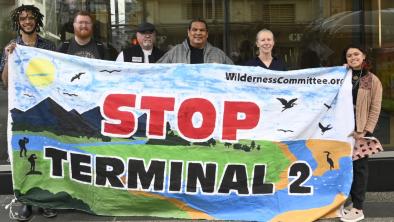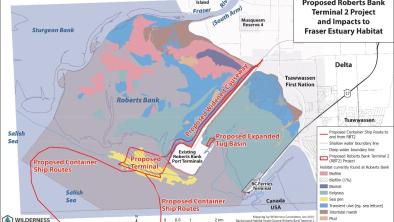DFO seeks to undo important precedent for at-risk species

Environmental groups headed back to court to uphold killer whale victory
VANCOUVER — Environmental groups vowed today to fight the Department of Fisheries and Oceans’ (DFO) appeal of a decisive and precedent-setting Federal Court ruling that declared that DFO must protect critical habitat of killer whales and other aquatic species.
DFO seeks to overturn the decision and claims that discretionary provisions in the Fisheries Act already legally protect the critical habitat of aquatic species such as the killer whale, rendering protection under the Species a Risk Act unnecessary.
“The court ruled that discretionary laws, such as the Fisheries Act, do not sufficiently protect critical habitat of these endangered species,” said Keith Ferguson, Ecojustice staff lawyer. “DFO is trying to limit the power of the Species at Risk Act, which intends to provide mandatory protection for at-risk species.”
The Fisheries Act gives Minister Gail Shea broad discretion to authorize the destruction of habitat.
“Clearly, discretionary protection doesn’t work,” said Susan Howatt of Sierra Club B.C. “DFO had the power to protect killer whales under the Fisheries Act for decades, during which B.C.’s killer whale population shrunk and became endangered.”
Last year, a conservation coalition, represented by Ecojustice, successfully argued in Federal Court that DFO must legally protect important aspects of critical habitat for southern and northern resident killer whales — such as food supply and marine environment quality.
If DFO’s appeal is successful, killer whales — and the more than 90 other at-risk species that stand to benefit from Judge Russell’s ruling — could have hard-fought legal protection of their critical habitat stripped.
“We’re not backing down,” said Christianne Wilhelmson, executive director of the Georgia Strait Alliance. “DFO would rather waste its time in court instead of focusing its energy and taxpayer money on protecting habitat for at-risk species that urgently need help to survive and recover.”
Background:
Once a species is listed under the Species at Risk Act, the government is required to identify the habitat the species needs to survive and recover — called its critical habitat — and then, for aquatic species, it must show how it plans to protect that habitat or how it is already protected.
For the killer whale, DFO first issued a Protection Statement claiming that existing laws, such as the federal Fisheries Act, policies, guidelines and the exercise of government discretion were enough to provide legal protection for the species.
The Federal Court disagreed. In his December 2010 ruling (attached), Justice Russell declared that: “The Minister of Fisheries and Oceans erred in law in determining that the critical habitat of the Resident Killer Whales was already legally protected by existing laws of Canada; … Ministerial discretion does not legally protect critical habitat within the meaning of section 58 of SARA, and it was unlawful for the Minister to have cited discretionary provisions of the Fisheries Act in the Protection Statement.”
DFO seeks to overturn this ruling.
Ecojustice represents David Suzuki Foundation, Dogwood Initiative, Environmental Defence, Greenpeace, Georgia Strait Alliance, International Fund for Animal Welfare, Raincoast Conservation, Sierra Club B.C., and the Wilderness Committee.
Contacts:
Keith Ferguson, staff lawyer | Ecojustice
604-685-5618
kferguson@ecojustice.ca
Susan Howatt, B.C. campaigns director | Sierra Club B.C.
250-888-6267
susan@sierraclub.bc.ca
Christianne Wilhelmson, executive director | Georgia Strait Alliance
604-633-0530 (office) or 604-862-7579 (cell)
christianne@georgiastrait.org
Gwen Barlee, policy director, Wilderness Committee
604-683-8220 (w) or 604-683-8220 (c)
For other inquiries, please contact:
Kimberly Shearon, communications associate | Ecojustice
604-685-5618 x242
kshearon@ecojustice.ca


